We may not have the course you’re looking for. If you enquire or give us a call on +44 1344 203999 and speak to our training experts, we may still be able to help with your training requirements.
Training Outcomes Within Your Budget!
We ensure quality, budget-alignment, and timely delivery by our expert instructors.
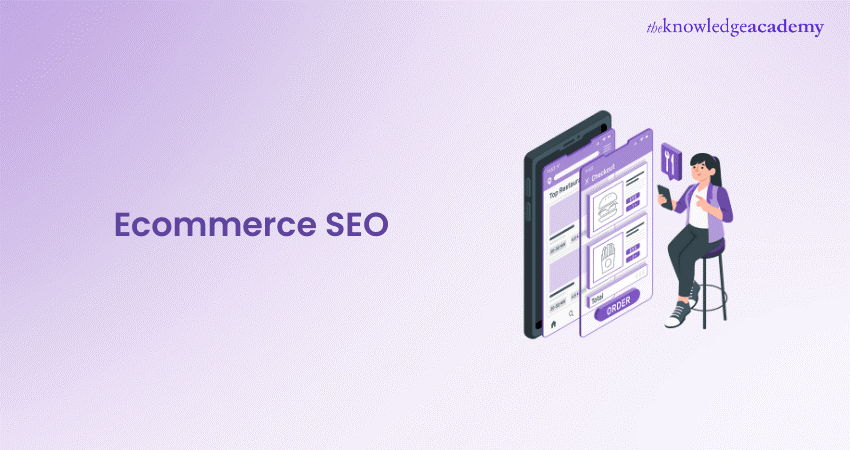
The rapid changes in online shopping, Ecommerce SEO is crucial for achieving visibility and success. Without it, your products could remain unnoticed among the competition. Grasping the concept of Ecommerce SEO involves learning how to make your store discoverable to customers actively searching for your products online. Let’s explore the field of optimisation for Ecommerce websites.
Table of Contents
1) What is Ecommerce SEO?
2) Importance of SEO Ecommerce Websites
3) How Does Ecommerce SEO Work?
4) Four Essential Components of an Ecommerce SEO Strategy
5) Tips for Effective Ecommerce SEO
6) Top Ecommerce SEO Tools
7) Benefits of Ecommerce SEO
8) Challenges in Ecommerce SEO
9) Ecommerce SEO Best Practices
10) Conclusion
What is Ecommerce SEO?
Ecommerce SEO involves increasing the online store's visibility in search engine. There is a wide range of tasks that are included in SEO marketing for Ecommerce. This involves generating material that meets the keyword searches entered on search engines. For instance, a True Classic Ecommerce store can enhance its website's SEO by producing content on the topic of "tips for folding t-shirts wrinkle-free."
a) Common tasks associated with Ecommerce SEO include:
b) Performing keyword research
c) Improving Site Structure
d) Optimising for On-page SEO Elements
e) Creating Quality Content
f) Building Backlinks
Importance of SEO Ecommerce Websites
SEO Ecommerce is essential for online shopping websites as it enables them to increase traffic and boost sales. The higher your online store ranks in search results, the more visibility your products receive. This results in an increase in sales in the long run.
a) It’s a money saving technique to reach your customers without paying for ads
b) It creates faith and reliability for the brand, as people tend to trust organic results more than paid ones
c) It gives you a competitive edge over other online stores that may not be optimised for SEO
How Does Ecommerce SEO Work?
Ecommerce SEO includes strategies to enhance visibility on search engine result pages to enhance traffic to websites. Having a high-ranking page will lead to boost traffic, making it necessary for your page to achieve a high rank.
In contrast to paid advertisements that require payment for each click to drive traffic to your online store, SEO enables you to attract relevant traffic without incurring significant costs. Google, Bing, and Yahoo assess your online store's ranking through SEO on search engines.
To enhance SEO for your online shop, it is crucial to focus on the content present on your website. Enhancing your Ecommerce SEO is achievable by increasing web store product pages, developing product descriptions, incorporating a blog, or conducting a technical audit of your site.
For your web pages to rank higher, one needs to make sure that the website is optimised for search. Here are some examples:
a) The keywords you use to target pages
b) The technical setup of your web store
c) Whether your web store is mobile friendly
Four Essential Components of an Ecommerce SEO Strategy
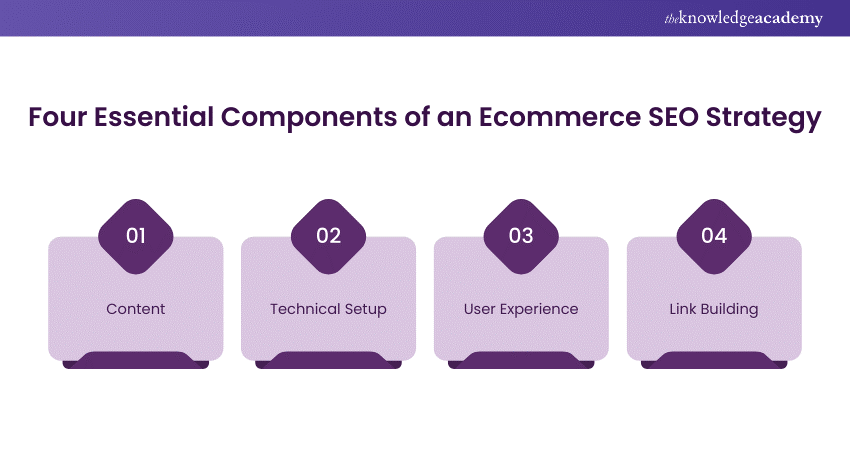
1) Content
Content forms the framework of any SEO strategy. In Ecommerce, this involves crafting product descriptions, blog posts, and category pages that are not only optimised with relevant keywords but also engaging and informative.
Unlock the Secrets of Marketing with our Content Marketing Course Register Now!
2) Technical Setup
A robust technical setup is essential for making sure web browsers can easily crawl and index your site. This involves maintaining a clean codebase, using proper URL structures, and having an XML sitemap.
3) User Experience
User experience (UX) impacts SEO rankings significantly. Web browsers like Google favour websites that are mobile friendly, quick to load, and easy to navigate. Providing a uniform and intuitive user experience is crucial for keeping customers interacted and minimising bounce rates.
4) Link Building
Link building continues to be a fundamental perspective of SEO strategies. For Ecommerce sites, acquiring high-quality backlinks from reputable sources enhances authority and improves rankings. Partnering with bloggers, influencers, and industry publications can strengthen your link profile.
Tips for Effective Ecommerce SEO
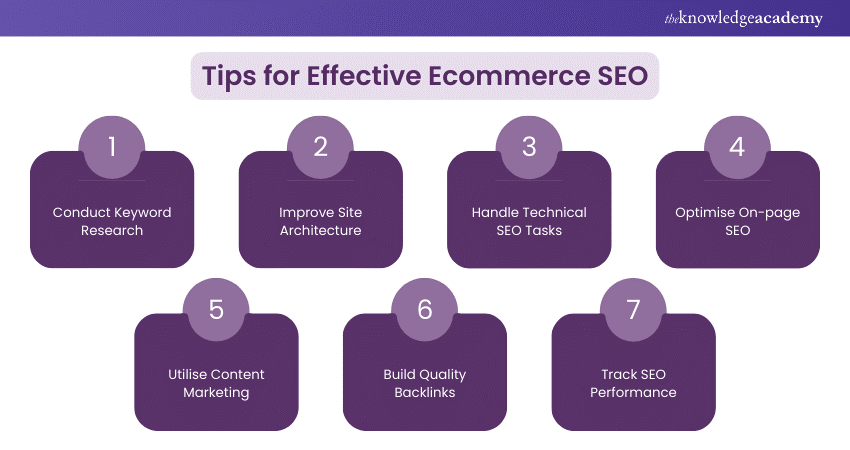
1) Conduct Keyword Research
The initial step in any Ecommerce SEO campaign is conducting keyword research. This involves identifying the words or phrases (keywords) that people use to search for the products online. By using these keywords to optimise your product and category pages, you can improve their rankings and drive more traffic to your website.
2) Improve Site Architecture
Site fundamentals refer to the organisation of your pages within your website. It’s a crucial technical SEO factor for any Ecommerce site. Technical SEO aims to enhance all technical elements of your site that impact your SEO performance.
An optimised site architecture:
a) Assists Google in crawling (discovering) all your product and category pages
b) Simplifies the process for users to find products
c) Distributes link equity (ranking strength) across your site to enhance rankings
When defining categories, incorporate your keywords. This not only enhances SEO but also helps users find what they’re looking for more quickly. For instance, using the example site structure below, we can define categories as follows.
3) Handle Technical SEO Tasks
You need to manage your technical SEO tasks correctly so that web browsers can easily crawl, index and understand the content of your Ecommerce website. A very important factor is mobile friendliness (since many users shop from their phones). Search engines are mobile-first indexers (meaning they rank the mobile version of your website first).
Thus, you want to provide a mobile-friendly design, quick loading times, and comfortable navigation for your users.
Furthermore, webpage speed matters for User Experience and SEO Rankings as well. Websites that are slow to load may see a rise in bounce rates, which can have an impact on search results. If you want to save it faster, then use leverage browser caching, optimise images, and minify CSS, JS files.
a) Ensure Mobile Friendliness
b) Optimise Website Speed
c) Create and Submit an XML Sitemap
d) Implement Structured Data (Schema Markup)
By tackling these technical SEO tasks, you ensure that your Ecommerce site operates smoothly and achieves high rankings on search engines.
4) Optimise On-Page SEO
On-page SEO involves improving specific webpages to increase their ranking in search engine results. For online retail websites, the main pages will typically be those focused on individual products and product categories. Optimise product descriptions, meta tags, titles, and image alt text with target keywords. Make sure each page has unique content to prevent duplicate content penalties.
a) Optimise Title Tags: Title tags are crucial for on-page optimisation, not just for Ecommerce but for any website. Google uses your title tag to understand your page’s topic and rank it accordingly. Your title tag should:
1) Be under 60 characters
2) Describe the page’s content
3) Include a target keyword
4) Attract Google searchers to click on it
b) Meta Descriptions: Meta descriptions typically appear just below the title tag in search results. For example, a meta description might be highlighted under “SEO Ecommerce” in the search. While Google doesn’t use meta descriptions for ranking, users do consider this text when choosing which search result to click on.
c) Friendly URL Structure: Google displays a URL in search results to make sure the users that which page will open when they click on. An URL highlighted above title tag on Google's search results page Here are some best techniques to keep in mind when creating URLs on Ecommerce website:
i) Keep Them Short and Descriptive: This ensures Google won’t truncate your URLs in search results.
ii) Use Hyphens to Separate Words: It is prefers using of underscores.
iii) Use Lowercase Text: This is a common rule to use lower-case text.
iv) Avoid Dates in URLs: It makes the content appear outdated.
v) Include Your Primary Keyword: This is best practice, but don’t force keywords unnaturally.
5) Utilise Content Marketing
A successful Ecommerce site goes beyond just optimised product and category pages. Investing in content marketing and creating various types of content is also essential. This can enhance your Ecommerce site’s SEO by:
a) Attracting Targeted Traffic by creating content that appeals to your audience
b) Generating Backlinks when other websites link to your content
c) Building Brand Recognition through consistent, valuable content
d) Offering Value to Potential Customers with helpful resources
e) How to Utilise Content Marketing:
a) Create Blog Posts: Blogging is the most effective and popular type of content marketing.
b) Share and Promote Blog Content: after creating blog it can be shared to the Ecommerce websites and start trying to bring traffic immediately. Sharing the blog on social media platforms and other platforms like Twitter and LinkedIn will help to boost the traffic.
6) Build Quality Backlinks
Backlinks are among the most essential ranking factors for Google, making link building an essential component of every Ecommerce SEO strategy.
Important terms to note down before getting started with Backlinks are:
Clim Unlinked Mentions are when someone mentions the brand or product online without linking to your site. Pages with unlinked mentions are often good for building link because:
a) The authors know your brand and they’re more likely to contact your outreach and link to you.
b) The authors like your product and maybe it is not applied to all, but it does to at least some of them. And those ones might consider linking.
Perform Backlink Gap Analysis: It is a method used to identify websites that link to your competitors but not to you. The concept is that if these sites are linking to your competitors, they might be open to linking to you as well. Various tools can assist with this analysis.
7) Track SEO Performance
One of the most crucial elements to a successful Ecommerce SEO strategy is keeping an eye on your performance overall. This will also help you to understand optimisation efforts and what areas need improvement. The first thing you should do to track performance is install analytics tools such as Google Analytics or The Search Console.
With these, you can learn how many users are coming to your site without any paid advertisements and track metrics such as bounce rate or conversion rates. Tracking these metrics keeps you updated on how your website is visible and performing in terms of user engagement. Here are some key points to do:
a) Check Organic Traffic
b) Check the Keyword Positions
c) Track Organic Conversions
Top Ecommerce SEO Tools
The following are the top Ecommerce SEO Tools which are important and useful:
Ahrefs
Ahrefs is an SEO software suite offering tools for link building, keyword research, competitor analysis, rank tracking, and site audits. Most of its features are tailored for marketing professionals. Ahrefs is designed to help users achieve higher Google rankings.

Avada SEO & Image Optimiser
Avada SEO is a plugin designed to help Ecommerce stores surpass their competitors. It provides features like image compression, site speed optimisation, schema markup, and other technical enhancements to keep your website search optimised. Additionally, it offers 24/7 customer support.
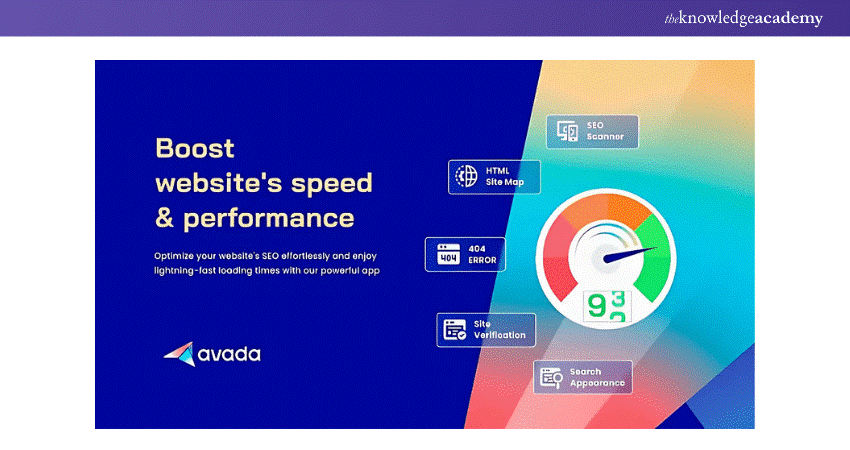
Google Analytics
Website owners are likely to use Google Analytics. This free SEO tool tracks and reports website traffic, providing insights to better understand customers, optimise the store for SEO, and improve marketing ROI.
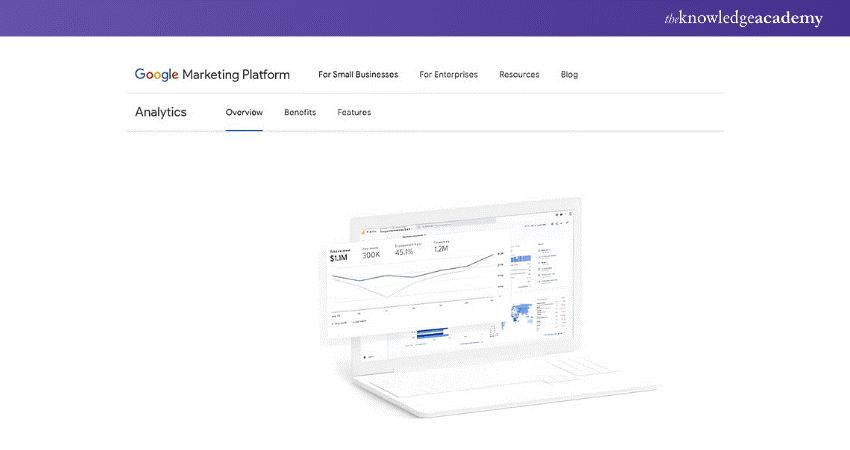
SEOAnt
SEOAnt is a free tool that allows you to run SEO checkup reports, repair broken links, and optimise image sizes. It also includes AI features for generating meta and alt text. This tool helps Ecommerce businesses increase their SEO rankings through automated solutions such as image compression, meta tag management, and more.
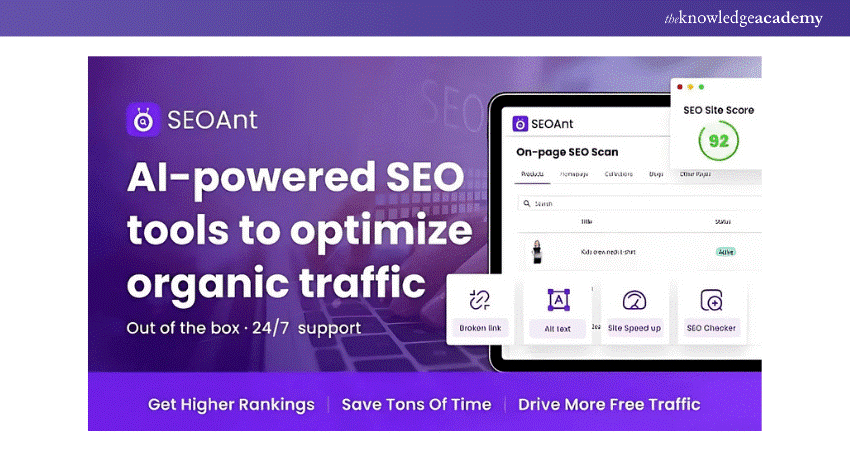
Improve your hands on experience on Marketing Tools with our Digital Marketing Tools Training. Sign up Now!
Benefits of Ecommerce SEO
There are number of benefits of Ecommerce SEO some of them are as follows:
1) Better User Experience: One of Google’s primary ranking factors is delivering a good User Experience. If your site targets the right keywords for your audience and addresses visitors’ queries, Google views this positively, boosting your ranking. Optimising User Experience for SEO not only improves rankings but also makes your web store more appealing and user-friendly for customers.
2) Expanding Reach: Ecommerce SEO increases traffic to your web store, thereby expanding your brand’s reach. When users find your site organically, you can later engage them with paid retargeting campaigns, making SEO remarketing a highly effective strategy. Ranking organically for relevant search terms also helps establish your brand authority, setting you apart from competitors.
3) Better Quality Traffic: When a website ranks higher for applicable keywords, it is more likely to fascinate visitors who are already interested in the products or services offered. This results in a higher conversion rate, as these visitors are more likely to become customers.
4) Cost Efficient: SEO is a cost-effective channel, especially when compared to paid ads. In paid advertisements, where you pay for each click, optimising your website attracts organic traffic at no cost.
Challenges in Ecommerce SEO
Some of the challenges associated with the Ecommerce SEO are:
1) Lack of Quality Content: The biggest issue with optimising E-commerce SEO is that some sites attempt to do it quickly and overlook that it’s not just about the amount of content, but the quality. Product pages shouldn’t merely copy the manufacturer’s descriptions, they need concise descriptions paired with images.
For organisations focused on B2B E-commerce SEO, it’s tempting to meet all the technical SEO requirements while neglecting the most crucial component: Unique content that adds value for visitors. Content is the most significant ranking factor for SEO and is essential for a successful long-term strategy.
2) Forgetting About the Technical Setup: Although content is paramount, it’s crucial not to overlook the technical SEO setup. Elements such as HTTPS, mobile-friendliness, page speed, indexation, and XML sitemaps are often neglected.
Ecommerce SEO Best Practices
1) Before you begin researching keywords, make sure to establish the profiles of your potential customers: Identifying your target audience prior to starting keyword research can improve the productivity of your efforts and result in more successful SEO. Developing buyer personas helps you understand the thought process of potential customers you desire to attract to your online shop.
2) Create Original Titles and Develop Unique Content: Search engines such as Google punish websites with content that is "duplicate or nearly duplicated". When creating new pages for your online shop, make sure the content is both relevant and original to increase the likelihood of ranking highly.
Make sure to have a specific keyword in mind to center your titles and descriptions for new pages around. Placing your target keyword towards the beginning and using it frequently in your content can improve its ranking as Google prioritises words located at the top of a page.
3) Update Content Regularly: SEO remains an ongoing effort even after new content is published. Monitoring your website's position is an essential part of achieving success in Ecommerce SEO. Make sure to revisit and update content regularly to keep it current and engaging.
You can opt to merge two pages in case you find that their keywords are competing with each other. This situation is referred to as keyword cannibalisation, which can be prevented by monitoring your content performance regularly.
Conclusion
E-commerce SEO is essential for the progress of an online store. By applying effective strategies and utilising the best tools, one can enhance website visibility, attract more traffic, and boost sales. Adopting these techniques and consistently optimising the site is crucial to outperform in the rapidly growing E-commerce market.
Get more knowledge of strategies with our Ecommerce Strategy Course. Register Now!
Frequently Asked Questions

SEO is crucial in digital marketing and can greatly impact the prosperity of an online retail store. Optimising the website for search engines can bring in more visitors, resulting in a boost in conversion rates and higher sales. Having a strong SEO strategy can boost a website's visibility on Google and attract potential customers.

It typically takes three to six months for SEO to begin delivering results. In certain instances, SEO may require a full year to show steady progress. SEO doesn't provide instant results; it takes time and dedication to notice enhancements in search engine rankings and website traffic.

The Knowledge Academy takes global learning to new heights, offering over 30,000 online courses across 490+ locations in 220 countries. This expansive reach ensures accessibility and convenience for learners worldwide.
Alongside our diverse Online Course Catalogue, encompassing 19 major categories, we go the extra mile by providing a plethora of free educational Online Resources like News updates, Blogs, videos, webinars, and interview questions. Tailoring learning experiences further, professionals can maximise value with customisable Course Bundles of TKA.

The Knowledge Academy’s Knowledge Pass, a prepaid voucher, adds another layer of flexibility, allowing course bookings over a 12-month period. Join us on a journey where education knows no bounds.

The Knowledge Academy offers various Digital Marketing Courses, including the Google Search Control Training and Practitioner Course, and the Google AdSence Course. These courses cater to different skill levels, providing comprehensive insights into Start an Ecommerce Business.
Our Digital Marketing Blogs cover a range of topics related to SEO Strategies, offering valuable resources, best practices, and industry insights. Whether you are a beginner or looking to advance your Marketing Management skills, The Knowledge Academy's diverse courses and informative blogs have got you covered.
Upcoming Digital Marketing Resources Batches & Dates
Date
 Ecommerce Strategy Course
Ecommerce Strategy Course
Fri 17th Jan 2025
Fri 21st Feb 2025
Fri 4th Apr 2025
Fri 6th Jun 2025
Fri 25th Jul 2025
Fri 7th Nov 2025
Fri 26th Dec 2025







 Top Rated Course
Top Rated Course



 If you wish to make any changes to your course, please
If you wish to make any changes to your course, please


